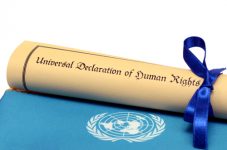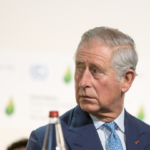With a UN Seat, Australia Needs to Rectify Indigenous Injustice

Australia won a seat on the UN Human Rights Council (UNHRC) on October 17. One of the five pillars of the Australian campaign for a position on the leading human rights body was a pledge to improve the rights of Indigenous peoples.
This commitment applies at both the international and domestic level. But given Australia’s long list of failures regarding the rights of Aboriginal and Torres Strait Islander peoples, many are less than optimistic that the nation’s promise will improve the situation locally.
Brazenly dismissed
Last Sunday, prime minister Malcolm Turnbull explained the government’s reasoning behind its outright rejection of the Referendum Council’s recommendation to establish a constitutionally-enshrined Indigenous body to advise parliament.
The council made its proposal in the Uluru Statement that was released on June 2. It was the culmination of a six-month process that saw twelve meetings of First Nations representatives to discuss the issue of constitutional recognition.
Turnbull claimed the proposal implausible as the all-Indigenous body was “contrary to the principles of equality.” Inherent in that statement was a failure to acknowledge, let alone act to rectify, the gaping inequality Indigenous people have suffered since the British first occupied their lands.
The PM said he remains committed to a referendum on constitutional recognition: the proposal that was rejected at the Uluru Summit. But the urgency around the matter has subsided, especially since Recognise, the campaign behind it, was disbanded in August.
Token gestures
Many First Nations peoples reject both constitutional recognition and the constitutionally-enshrined voice to parliament. They favour the more substantial proposal of establishing treaties between the various Indigenous nations throughout the continent and the federal government.
As Terry Mason, curriculum developer and lecturer at Deakin University’s Institute of Koorie Education, explains a concern around recognition in the constitution is “that it would take away sovereign rights and lead to a complacency toward any further discussion on these matters.”
This is what happened after the federal government made its apology to the stolen generation, Mason pointed out, as there was a lack of subsequent action. “Many people feel that a voice with only an advisory capacity is of similar concern,” he told Sydney Criminal Lawyers®.
The Awabakal man said he isn’t surprised the government rejected an advisory voice in the constitution, as its “already cut funding to the National Congress of Australia’s First Peoples,” which is a government established advisory body.
The refusal to even consider the proposal has united many opposing voices in condemnation of Turnbull, Mr Mason notes. But, he believes it’s serving as a distraction from other issues, such as the 600 asylum seekers abandoned on Manus Island and the government’s failed Closing the Gap policy.
Violations of Indigenous rights
On whether the Australian UN seat will transpire into Indigenous rights improvements domestically, Mason is sceptical. “I am absolutely flabbergasted that Australia could claim a track record on Indigenous issues in taking a seat on the UNHRC,” he declared.
The long-term Aboriginal rights activist went on to list numerous examples of where the Australian government has failed the First Peoples of this continent, which includes the three times the Racial Discrimination Act (RDA) 1975 was suspended.
The Howard government passed the Hindmarsh Island Bridge Act 1997, which suspended the provisions of the RDA to allowed for the construction of a bridge on the sacred grounds of the Ngarrindjeri people in South Australia.
The Native Title Amendment Act 1998 prevented the RDA from applying to certain sections of the Native Title Act 1993, so that when native title rights were extinguished in favour of pastoral leases, Indigenous people weren’t entitled to compensation for the loss of their property rights.
And then there’s the Northern Territory National Emergency Response Act 2007, which suspended the RDA outright in order to allow for “special measures” to be implemented under the framework of the NT Intervention.
These measures included the introduction of the controversial BasicsCard, which quarantined 50 percent of local people’s welfare payments.
The act also abolished the much-lauded Community Development Employment Project. It was eventually replaced by the Community Development Program, which forces Indigenous people in remote areas to work 25 hours a week for the dole, while people in urban areas only work 15 hours.
The Howard government sent the army into 73 remote Aboriginal communities in the Northern Territory to enforce the measures of the Intervention, which was a policy that was shown to be based on lies.
In 2014, the government cut $534 million in funding to Indigenous programs. Aboriginal deaths in custody continue, with four in NSW over the last 24 months. And Indigenous children are nine times more likely to be forcibly removed from their families, than non-Indigenous children.
“Widening of the gap,” as Mr Mason put it, is “not a track record to be proud of.”
A path forward
Australia is the only Commonwealth nation not to have established a treaty with its First Peoples. A series of treaties would set up a formal agreements between the government and Indigenous nations that would deal with matters of self-determination, land rights and custodianship.
Another of the proposals contained in the Uluru Statement was to establish a Makarrata or treaty commission. The government has said it will set up a parliamentary inquiry to consider this, along with other recommendations set out in the statement.
As far as Mr Mason is concerned, inquiries aren’t needed, as treaty negotiations could be entered into immediately. “There has never been and still is no real impediment to holding negotiations for robust modern treaties,” he continued.
But, Mason pointed to recent amendments to the Native Title Act that further eroded the rights of First Nations peoples in regard to Indigenous land use agreements that indicate the “government may need sustained pressure to engage in the treaty process.”
It’s hardly convincing
Australia presents itself as a human rights leader internationally. Indeed, the nation has ratified seven out of the eight major international human rights treaties. However, this hasn’t meant these rights have been protected at the domestic level.
At the UNHRC, the nation has declared that it will champion Indigenous rights. Although, it’s yet to be seen whether this will impact upon the situation within its borders.
But, it must be remembered that the only international rights agreement the Australian government refused to ratify was the United Nations Declaration on the Rights of Indigenous Peoples. And this seems rather ominous.








